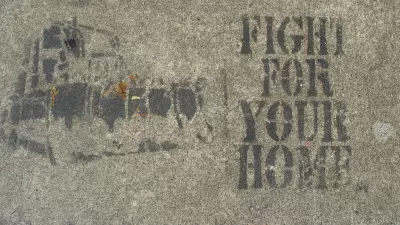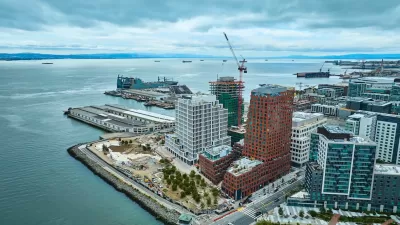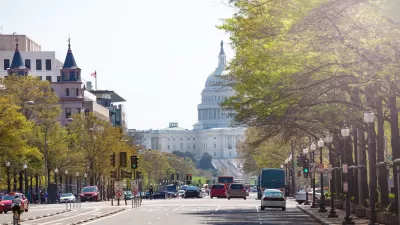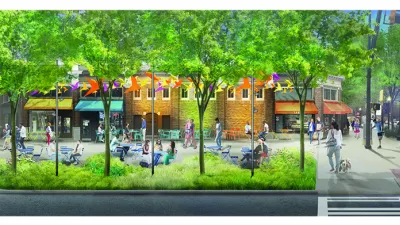The concept of the flâneur was created in the 19th century in response to the encroaching speed and efficiency of the Industrial Age. Can the flâneur now fashion a political response to the Age of the Automobile?

Planetizen blogger Steven Snell launches a new column at Fast Forward Weekly with an urbanist think piece that pits the city of the ambling flâneur against the city of the automobile. The article serves as a call for spatial justice.
First Snell exemplifies the flâneur’s politics by describing the tradition of taking a turtle for a walk. “By taking a turtle for a walk, a flâner disassembles the boring, rational use of urban space; the act avoids the intended logic of the city, which is an outcome of a certain ideology and the period’s political practices. The practices of the flâneur soon became translated into the concept of having a ‘right to the city,’ a theory of spatial justice. And theories in turn prescribed novel, concrete practices to take back the city from the oppressive and discriminatory constructions of modernist city planning.”
Contrast that with the legacy of much 20th century planning and development. “Although the automobile was supposed to be the ultimate form of modernity — individualism, the efficiency of point-to-point convenience — it’s led to urban sprawl (along with psychological, environmental and health implications). It’s led to big-box stores, drive-through coffee shops and ATMs, dispersed communities with often ironic names. It’s led to a city designed around its bullish behaviours. The logic of city planning for the single occupancy vehicle has led to oppressive spaces, spatial injustice.”
Snell points to acts of tactical urbanism and collective action as examples that the world is ready for the flâneur to recover the spaces of the city.
FULL STORY: Taking a turtle for a walk

Planetizen Federal Action Tracker
A weekly monitor of how Trump’s orders and actions are impacting planners and planning in America.

Maui's Vacation Rental Debate Turns Ugly
Verbal attacks, misinformation campaigns and fistfights plague a high-stakes debate to convert thousands of vacation rentals into long-term housing.

Restaurant Patios Were a Pandemic Win — Why Were They so Hard to Keep?
Social distancing requirements and changes in travel patterns prompted cities to pilot new uses for street and sidewalk space. Then it got complicated.

In California Battle of Housing vs. Environment, Housing Just Won
A new state law significantly limits the power of CEQA, an environmental review law that served as a powerful tool for blocking new development.

Boulder Eliminates Parking Minimums Citywide
Officials estimate the cost of building a single underground parking space at up to $100,000.

Orange County, Florida Adopts Largest US “Sprawl Repair” Code
The ‘Orange Code’ seeks to rectify decades of sprawl-inducing, car-oriented development.
Urban Design for Planners 1: Software Tools
This six-course series explores essential urban design concepts using open source software and equips planners with the tools they need to participate fully in the urban design process.
Planning for Universal Design
Learn the tools for implementing Universal Design in planning regulations.
Heyer Gruel & Associates PA
JM Goldson LLC
Custer County Colorado
City of Camden Redevelopment Agency
City of Astoria
Transportation Research & Education Center (TREC) at Portland State University
Jefferson Parish Government
Camden Redevelopment Agency
City of Claremont





























